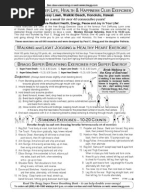frenkel’s exercises
It is defined as the series of gradual progressive exercises designed to increase coordination.
Method of treating the ataxia & incoordination.
Mechanism is based on voluntary control of movement by use of sensory mechanism i.e sight, sound & touch to compensate for the loss of kinesthetic sensation.
Essentials are
- Concentration of attention
- Precision


Frenkel Exercise Manual Download

- Frenkel Exercises are a series of motions of increasing difficulty 30+ Hand Therapy Exercises after Stroke Evidence Based Therapeutic (PDF Download Available) Effectiveness of physiotherapy for (PDF Download Available).
- Physical therapy (PT), also known as physiotherapy, is one of the healthcare professions.Physical therapy is provided by physical therapists who promote, maintain, or restore health through physical examination, diagnosis, prognosis, patient education, physical intervention, rehabilitation, disease prevention and health promotion. Physical therapists are known as physiotherapists in many.
- Heiden, Switzerland, situated 2,500 feet above the sea level, overlooking the beautiful Lake Constance and the five cantons bordering it, formerly had the reputation of being a whey cure. It became especially popular through the annual visits of Albrecht Von Graefe, the so-called 'Father of.
- These 30 minutes of exercises include 10 minutes of exercise aimed at the function to improve, 10 minutes of stretching exercises and 10 minutes of muscular strengthening. We therefore recommend where possible that you spend at least 30 minutes a day on the self-rehabilitation exercises that have been prescribed for you.
Frenkel Exercises are a series of motions of increasing difficulty performed by ataxic patients to facilitate the restoration of coordination. Frenkel's exercises are used to bring back the rhythmic, smooth and coordinated movements. 285 People Used.
Frenkel Exercise Manual Online

III. Repetition
TECHNIQUE of frenkel’s exercises
Position & clothing
Explanation of exercise
Attention of patient
Speed of movement
ROM by marking spots
Repetition of exercises
Rest periods
PROGRESSION of frenkel’s exercises
Made alteration in speed, range & complexity
Quick movements, less control
Slow movement, high control
Simple movements build up to form complex movements e.g walking
According to disability re-education starts from lying to standing.
frenkel’s exercises For The Legs In Lying
a)Lying(Head raised); Hip abduction& adduction
b)Lying(Head raised);one Hip & knee flexion & Extension
c)Lying(Head raised); one Leg raising to place Heel on specific mark
d)Lying(Head raised); Hip & Knee flexion & extension, abduction & adduction
frenkel’s exercises For The Legs In Sitting
a)Sitting;one Leg stretchin,to side heel to a position indicated by a mark on the floor.
b)Sitting; alternate Leg stretching & lifting to place Heel or Toe on specified mark.
c)Stride sitting; change to standing and then sit down again.
Exercise For The Legs In Standing
a)Stride standing; transference of weight from Foot to Foot.
b)Stride standing; walking sideways placing Feet on marks on the floor.
c)Standing;walking placing Feet on marks.
d)Standing; turn around.
e)Standing; walking and changing direction to avoid obstacles.
Exercises For The Arms
a)Sitting (one Arm supported on a table or in slings); Shoulder flexion or extension to place Hand on a specified mark.
b)Sitting; one Arm stretching, to thread it through a small loop or ring.
c)Sitting; picking up objects and putting them down on specified marks.
EXERCISES TO PROMOTE MOVEMENT AND RHYTHEM
All exercises are repeated to rhythmic count.
a)Sitting; one Hip flexion & adduction.
b)Half lying; one Leg abduction to bring knee to side of plinth, followed by one Knee bending to put Foot on floor, the movement is then reversed & repeated.
c)Sitting; lean forward and take weight on Feet(as if to stand), then sit down again.
d)Standing; Arms swing forwards & backwards(with partner holding two sticks).
e)Standing or walking; bounce & catch, or throw & catch a ball.
Save